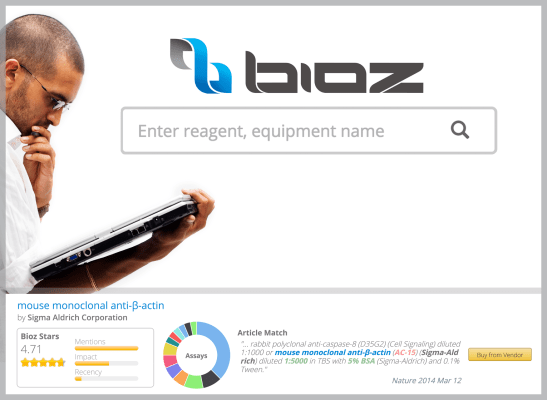Bioz, a new search engine for life science experiments, wants to reduce the time it takes researchers to thumb through thousands of science articles published online and get them right to the findings relevant to their search.
The Palo Alto startup does this by offering up article extracts from published science papers using natural language processing. The Bioz platform helps researchers select products, plan experiments, write papers, apply for grants and collaborate, speeding up experimentation and drug discovery.
It’s not the first to offer up scientific papers through search – Google Scholar already surfaces articles for researchers from peer-reviewed resources, as does the popular PLOS ONE. But Bioz believes it has a business model that will set it apart from the others.
Bioz doesn’t charge the researcher for its findings. Instead, it makes money from a flat fee per click to the vendor. It’s not entirely clear how this would work. The explanation is quite murky here and there is a lot of free competition in the space that does not attach itself to an advertising model for vendors but from what we got from a spokesperson, vendors are charged when people click on a vendor site while searching for articles.
Eventually, Bioz will work very similarly to Google Adwords says co-founder, Daniel Levitt. vendors and manufacturers of life science products will bid per click instead of the flat fee.
Bioz search engine works using NLP and machine learning to mine for hundreds of millions of pages of complex and unstructured scientific papers throughout the web and then summarizing those papers to make it easy for researchers to click through to the information they want.
“Bioz revolutionizes search technology and delivers information in a way that focuses on the researcher,” investor Gary Wilcox, a PhD and developer of Cialis, said of the platform.
The startup claims over 30,000 users from academic research labs and industry R&D labs, from more than 1,000 universities and biopharma companies, from 40 countries are using its search engine – all for free.
Bioz announced it has already gained $3 million in seed funding from industry investors, including Esther Dyson.
“The business model for Bioz is around things you can buy, but there’s a subtext that you should be paying attention to everything,” Dyson said of why she invested. “And Bioz can help you find all those external factors you may not be noticing.”
